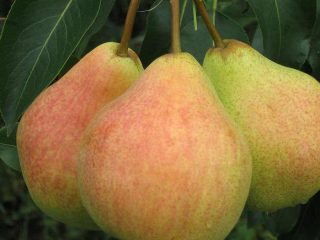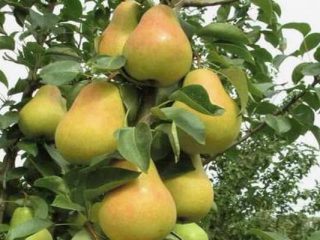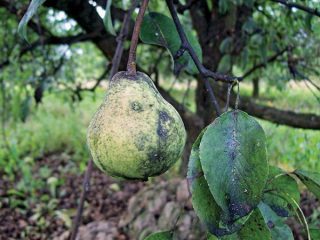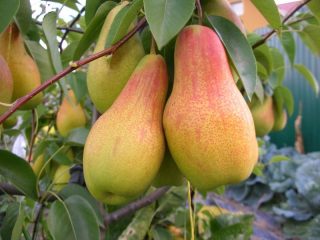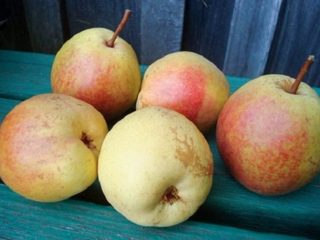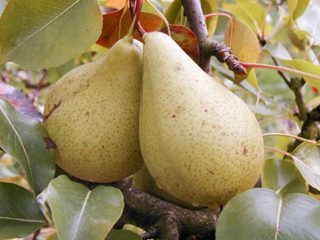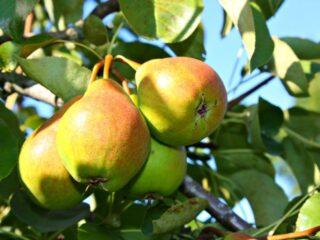Content
Bogataya pear is a variety known to gardening lovers in central Russia. It feels good not only in the southern territories traditional for this garden culture, but also in gardens near Moscow and even in the Urals. Thanks to increased frost resistance combined with high yield, the Bogataya pear variety is gaining more and more fans.
History of appearance
This variety is the result of the work of breeders at the Chelyabinsk Experimental Station. When breeding a hybrid, they were faced with the task of creating an unpretentious fruit tree that could tolerate low temperatures without loss of yield. The originator managed to achieve a high-yielding stable variety with excellent consumer characteristics of the fruit.
Description of pear variety Bogataya with photo
Bogataya pear is a tree with a powerful straight trunk and large skeletal branches. Each year it bears medium to large fruits.

Pear Bogataya is characterized by medium height and a slightly spreading crown.
Tree
This variety belongs to the medium-sized varieties. It reaches a height of 10 m. The tree forms a moderately spreading crown. The average life expectancy is about 45 years.
The leaf blade is green, oval in shape, pointed, with small teeth along the edges, attached to long petioles. The upper part of the leathery leaf is shiny, the lower part is matte.
The first flowering occurs at the age of 5–6 years. The Bogataya pear blooms from the third decade of May with numerous white flowers collected in inflorescences.
Fruit
The fruits are rounded, weighing from 150 to 200 g, but often reach 250 g. A faint blush can sometimes be seen on the rich yellow skin. The pulp is white, dense. The core is medium-sized, with a small number of small seeds.
Characteristics of pear Rich
Bogataya pear is a frost-resistant, high-yielding variety with annual fruiting. The culture is highly valued for its disease resistance, unpretentiousness, excellent fruit taste and keeping quality.
Taste qualities
Bogataya pear has excellent taste characteristics: the fruits are sweet, juicy, without astringency.
If the fruit tree grows on soils poor in calcium, granulations do not form in the pulp, and it has a delicate and soft consistency.
Ripening time
Bogataya pear is a winter variety. Its fruits reach maturity by the second half of October. They can be consumed immediately after collection, that is, they do not require ripening. It is noteworthy that all the fruits ripen at the same time.
Productivity
Among other winter varieties, this variety stands out for its high yield. 40–50 kg of fruits are collected from an adult tree.The first harvest can be expected from a plant that has reached five years of age.
Frost resistance of pear Rich
This variety is characterized by increased resistance to frost. The tree can withstand temperatures down to -30°C.
Pollinators of the Bogataya pear
Bogataya pear is a self-fertile variety. This means that it does not need pollinators to form fruits. To increase productivity, it is recommended to plant 1-2 pear trees of other varieties with a similar flowering period nearby. For example, “Siberian”, “Theme”, “Dangling” are suitable.
Growing regions
In addition to the southern regions of Russia, territories with a more severe climate are suitable for this variety. The increased frost resistance declared by the originator allows the Bogataya pear to be grown in the central part of Russia, the Urals and even in Siberia.
Disease resistance
This variety is resistant to rot and fungal infections, however, if not properly cared for, the tree can suffer from leaf and fruit gall midges, codling moths, gall mites, and copperhead. You can cope with the invasion of these pests with the help of insecticides.
Advantages and disadvantages
This variety combines a number of advantages that make it extremely attractive for cultivation. In proper conditions, the harvest is stored almost until mid-winter.

Due to their excellent taste, pears of this variety can be consumed both raw and used for processing.
Pros:
- frost resistance;
- unpretentiousness;
- precocity;
- pleasant taste;
- keeping quality and transportability of fruits;
- disease resistance;
- self-fertility.
Minuses:
- the tree's susceptibility to insect pests if not properly cared for;
- dependence of fruit quality on soil composition.
Landing rules
To plant this fruit tree, choose well-lit areas protected from the winds. When planning your garden, you should avoid wetlands and areas with shallow groundwater.
The soil for the crop must be fertile, loose, with a significant content of coarse sand. This is necessary to ensure air access to the root system. When growing pear orchards on soils with a high calcium content, granulations form in the pulp, so it is better to choose substrates with a slightly acidic reaction.
Plants that have reached two years of age are suitable for planting. The dry roots of the seedlings are cut off and the tops are shortened. This significantly increases survival rate.
Like other fruit trees, pear trees are planted in late autumn or early spring.
Landing is carried out as follows:
- The roots are placed in a container with water for several days.
- Dig a hole and fill it with nutrient soil mixture to 2/3 of the volume.
- The seedling is lowered into the hole and buried, leaving the neck of the plant above the soil surface.
- The tree is well watered and tied to a stake.
Care instructions
Caring for the Bogataya pear is not particularly difficult. Like other fruit trees, it needs the following procedures:
- Trimming.The formation of the crown should begin from the second season after planting the tree, sanitary pruning is carried out regularly at the usual time, and rejuvenating pruning is carried out as necessary.
- Regular loosening.
- Fertilizing with organic fertilizers, such as urea and ammonium nitrate.
- Preventive treatments for diseases.
- Abundant watering. It is especially important during bud formation, flowering, fruit formation and the beginning of leaf fall.
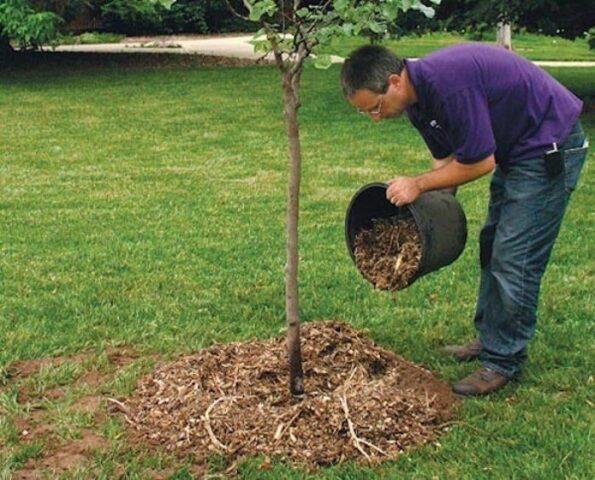
Mulching the pear tree trunk is not necessary, but it makes caring for the tree much easier.
Collection and storage
Harvesting begins in mid-autumn. In the second half of October, the fruits reach full maturity and do not require ripening. Despite the fact that pears of this variety are not prone to shedding, they need to be collected from the trees within a few days. They will be better stored and will not lose their consumer properties.
Bogataya pear has good keeping quality; if storage conditions are met, the fruits remain fresh for about 90 days.
Conclusion
Bogataya pear is an excellent variety for growing in gardens almost throughout our country. Resistance to weather conditions, low maintenance requirements, high yield and excellent taste of the fruit make this variety extremely popular when grown in garden plots.
Reviews from gardeners about the Bogataya pear

